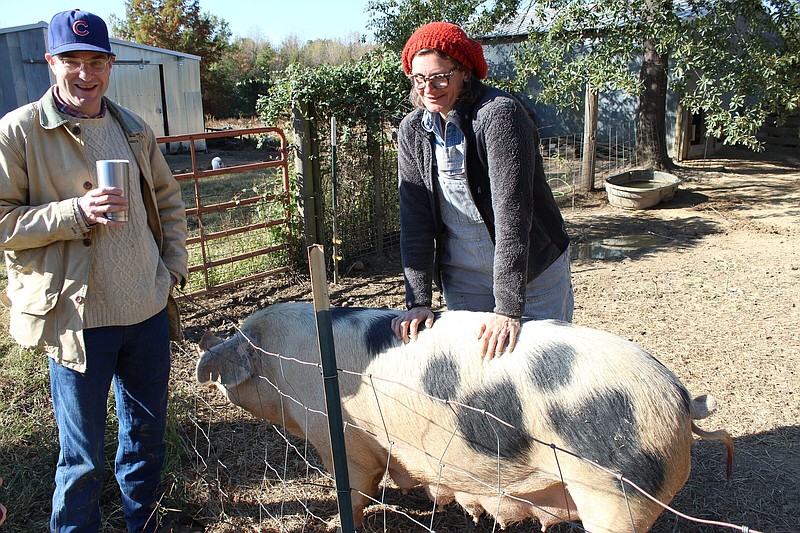BIGELOW -- Many food producers are still reeling from kinks in the supply chain caused by the pandemic, but small farm livestock producers in Arkansas are dealing with a bottleneck caused by a lack of meat processing plants.
Fans of Porch Swing Farms in Bigelow searching the farm's website for its unique heritage breed bacon will find that it's not available.
Delays in getting the pork processed are to blame.
Aaron Baldwin and Holly Payne of Porch Swing Farms keep a few sows to breed and raise their piglets until they are big enough to sell; the farm raises a heritage breed of pigs called Gloucestershire Old Spots, developed in the 1800s in England.
"I grew up hearing at the dinner table what pork used to taste like and I didn't really know what that meant, but the dinner table is really important [to our families], we love to eat," Baldwin said.
He said that instead of simply taking the pigs to the meat processing facility when the time is right, the farm had to make appointments well in advance.
"That's because all of those processors are full up for anywhere between the next five to seven months, there are no vacancies," Baldwin said.
"We have to maintain the animals in the meantime and we have to estimate how long it will take us to get our animal to where we want it for when it's butchered. We made appointments for April and May. As young farmers, that was a difficult lesson for us to learn."
Delaying slaughter and meat processing is difficult for some smaller livestock producers because of higher than normal feed prices this year. Some may even take their animals into Oklahoma for butchering, Baldwin said.
This lack of access to processing services makes it harder for smaller producers to compete with industrial producers.
"We only know of three facilities in the entire state of Arkansas that are USDA-certified to process pigs, and there may be one or two that are USDA-certified to process chickens," Baldwin said.
Custom processors are available for preparation of meat products, as long as the meat is for the household and not retail sales, Payne said.
Arkansas recently approved a new meat inspection program and finalized a cooperative agreement with the U.S. Department of Agriculture's Food Safety and Inspection Service (FSIS) to allow the state Department of Agriculture to inspect meat products to be shipped for sale within the state.
Some meat processing facilities may be unwilling to opt for the new state certification and rely on the USDA certification, as processors in Arkansas can use the USDA certification to sell outside the state and often already have a number of customers.
"More state inspectors would be great, but also changing the rules on custom processing would help us and would help the general public get more of this pork in their hands," Payne said.
Additional meat processing facilities opting for state inspection program would open up the retail market so smaller livestock producers could sell meat direct to a school district, for example, Baldwin said.
The agreement allows for the inspection of meat products for shipment within Arkansas, but inspection services must align with USDA guidelines under the Federal Meat Inspection Act.
Arkansas joins 28 other states in participating in the USDA's State Meat and Poultry Inspection program, through which the Food Safety and Inspection Service will provide up to 50% of the state's operating funds, training and other assistance for the new program.
The program is supposed to help open retail markets up for smaller livestock producers.
Meat processors have the option to apply for federal or state inspection services, but meat products produced under state inspection can only be sold in the state of Arkansas unless the processor participates in the Cooperative Interstate Shipment program.
"That's what small farmers like us need, is more access to having meat processed," Baldwin said.
The couple have spoken to a few meat processors about the new program and said some don't seem too keen on changing over to the state meat inspection program.
"They don't feel like it's going to change things for them," Baldwin said.
"If [a processor] wanted to meet state guidelines, it's going to cost you the same as to meet federal guidelines because the state guidelines are the same as the federal guidelines, and the reason there aren't more federally inspected facilities is because of the cost."
